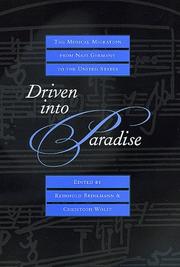| Listing 1 - 10 of 14 | << page >> |
Sort by
|
Book
ISBN: 9783487150659 Year: 2014 Publisher: Hildesheim ; Zürich ; New York Georg Olms Verlag
Abstract | Keywords | Export | Availability | Bookmark
 Loading...
Loading...Choose an application
- Reference Manager
- EndNote
- RefWorks (Direct export to RefWorks)
Book
ISBN: 9782753593541 275359354X Year: 2023 Publisher: Rennes : Presses universitaires de Rennes,
Abstract | Keywords | Export | Availability | Bookmark
 Loading...
Loading...Choose an application
- Reference Manager
- EndNote
- RefWorks (Direct export to RefWorks)
Ce volume éclaire les processus de l'exil dans toute leur complexité et analyse leur impact au cours du long XXe siècle sur les productions musicales et littéraires en mettant l'accent sur leur circulation, en tenant compte des sociétés de départ et d'accueil et en éclairant les communautés exilées. A travers cette histoire des cultures d'exil, c'est aussi le poids du facteur politique dans les échanges culturels qui est analysé. Les relations entre exil et création, la transformation des pratiques culturelles et la fabrique des imaginaires sont au coeur de la réflexion. L'approche globale des exils artistiques, qui traverse les continents et les formes, interroge le rôle des exilés - et des mouvements de solidarité internationale qu'ils suscitent - dans le processus de mondialisation contemporaine. [Payot.ch]
Book
ISBN: 9782213705576 2213705577 Year: 2018 Publisher: Paris: Fayard,
Abstract | Keywords | Export | Availability | Bookmark
 Loading...
Loading...Choose an application
- Reference Manager
- EndNote
- RefWorks (Direct export to RefWorks)
Music --- Expatriate musicians --- Musicians --- Political aspects --- History --- Exil --- Music - Political aspects --- Expatriate musicians - History - 19th century --- Expatriate musicians - History - 20th century --- Musicians - Biography --- Revolutie --- Stalinisme --- Nazisme --- 19e eeuw --- 20e eeuw
Book
ISBN: 9781649033055 9781649033062 1649033060 1649033052 Year: 2023 Publisher: Cairo, Egypt : The American University in Cairo Press,
Abstract | Keywords | Export | Availability | Bookmark
 Loading...
Loading...Choose an application
- Reference Manager
- EndNote
- RefWorks (Direct export to RefWorks)
A historical and contemporary study of Palestinian musicianship in exile in the Middle East, spanning half a century in disparate locations Palestinian Music in Exile is a historical and contemporary study of Palestinian musicianship in exile in the Middle East, spanning half a century in disparate and undocumented locations. The stories taking center stage show creatively divergent and revolutionary performance springing from conditions of colonialism, repression, and underdevelopment. What role does music play in the social spaces of Palestinian exile? How are the routes and roadblocks to musical success impacted by regional and international power structures? And how are questions of style, genre, or national tradition navigated by Palestinian musicians? Based on seven years of research in Europe and the Middle East, this timely and inspiring collection of musical ethnographies is the first oral history of contemporary Palestinian musicianship to appear in book form, and the only study to encompass such a broad range of experiences of the ghurba, or place of exile.
Palestinian Arabs --- Music --- Expatriate musicians --- History and criticism. --- Political aspects. --- History and criticism --- Political aspects

ISBN: 0874172144 Year: 1993 Publisher: Reno ; Las Vegas ; London University of Nevada Press
Abstract | Keywords | Export | Availability | Bookmark
 Loading...
Loading...Choose an application
- Reference Manager
- EndNote
- RefWorks (Direct export to RefWorks)
815 --- Jazz en lichte muziek - Monografieën componisten en uitvoerders --- Expatriate musicians --- Europe --- Japan --- Jazz musicians --- United States --- Jazz --- History and criticism --- 78.39.1 --- Musicians

ISBN: 0520921178 058517640X 9780520921177 9780585176406 0520214137 Year: 1999 Publisher: Berkeley, Calif. : University of California Press,
Abstract | Keywords | Export | Availability | Bookmark
 Loading...
Loading...Choose an application
- Reference Manager
- EndNote
- RefWorks (Direct export to RefWorks)
The forced migration of artists and scholars from Nazi Germany is a compelling and often wrenching story. The story is twofold, of impoverishment for the countries the musicians left behind and enrichment for the United States. The latter is the focus of this eminent collection, which approaches the subject from diverse perspectives, including documentary-style newspaper accounts and an exploration of Walt Whitman's poetry in the work of Paul Hindemith and Kurt Weill.The flood of musical migration from Germany and Austria from 1933 to 1944 had a lasting impact. Hundreds of musicians and musicologists came to the United States and remained here, and the shaping power of their talents is incalculable. Several essays provide firsthand insights into aspects of American cultural history to which these émigrés made essential contributions as conductors, professors, and composers; other essays tell of the traumatic experience of being exiled and the difficulties of finding one's way in a foreign country. While the migration infused the U.S. with a distinctly European musical awareness, at the same time the status and authority of its participants tended to intervene in the development of a genuinely American cultural voice. The story of the unprecedented migration that resulted from Nazism has many dimensions, and Driven Into Paradise illuminates them in deeply human terms.
Expatriate musicians --- Music --- National socialism and music. --- Exiles --- Musicians --- National socialism and music --- Music, Dance, Drama & Film --- Music History & Criticism, General --- Artists --- Persons --- Aliens --- Deportees --- Refugees --- Music and national socialism --- History and criticism. --- History --- History and criticism --- Biography --- Musicians.
Book
ISBN: 0253017769 9780253017765 9780253017550 0253017556 9780253017611 0253017610 Year: 2015 Publisher: Bloomington, Indianapolis, Indiana : Indiana University Press,
Abstract | Keywords | Export | Availability | Bookmark
 Loading...
Loading...Choose an application
- Reference Manager
- EndNote
- RefWorks (Direct export to RefWorks)
Survivors of the Armenian genocide of 1915 and their descendants have used music to adjust to a life in exile and counter fears of obscurity. In this nuanced and richly detailed study, Sylvia Angelique Alajaji shows how the boundaries of Armenian music and identity have been continually redrawn: from the identification of folk music with an emergent Armenian nationalism under Ottoman rule to the early postgenocide diaspora community of Armenian musicians in New York, a more self-consciously nationalist musical tradition that emerged in Armenian communities in Lebanon, and more recent clashes o
Musicians --- Music --- Expatriate musicians --- Armenians --- Ethnology --- Indo-Europeans --- Artists --- Art music --- Art music, Western --- Classical music --- Musical compositions --- Musical works --- Serious music --- Western art music --- Western music (Western countries) --- Social conditions. --- History and criticism. --- 78.33.2
Book
ISBN: 9004544100 9004540652 Year: 2023 Publisher: Boston : BRILL,
Abstract | Keywords | Export | Availability | Bookmark
 Loading...
Loading...Choose an application
- Reference Manager
- EndNote
- RefWorks (Direct export to RefWorks)
Fresh research on the experiences of music and musicians in exile from Nazi Europe, exploring refugee experiences in Europe, the USA, Australia and Shanghai, the role of institutions, and the reception of individual creative work during and after the Second World War.
Music --- National socialism and music --- Jews --- Jewish composers --- Jewish refugees --- Expatriate musicians --- Social aspects --- History --- History and criticism. --- Migrations. --- Social conditions --- Europe --- United States --- Australia --- China --- Emigration and immigration
Book
ISBN: 2800413816 9782800413815 Year: 2006 Volume: 112 Publisher: Bruxelles Éditions de l'Université
Abstract | Keywords | Export | Availability | Bookmark
 Loading...
Loading...Choose an application
- Reference Manager
- EndNote
- RefWorks (Direct export to RefWorks)
Histoire de la musique --- Muziekgeschiedenis --- Stravinsky, Igor --- Musicians --- Expatriate musicians --- Music critics --- Musiciens --- Musiciens expatriés --- Critiques musicaux --- Social networks --- Public opinion --- Attitudes --- Réseaux sociaux --- Opinion publique --- Stravinsky, Igor, --- Criticism and interpretation --- History --- 780.92 --- Arts Music History Composers, Performers, Critics --- Musiciens expatriés --- Réseaux sociaux --- Stravinsky, Igor, - 1882-1971 --- Stravinski, igor fedorovitch (1882-1971) --- Critique musicale --- Appréciation --- 1900-1945

ISBN: 0945193599 Year: 1995 Publisher: Stuyvesant Pendragon Press
Abstract | Keywords | Export | Availability | Bookmark
 Loading...
Loading...Choose an application
- Reference Manager
- EndNote
- RefWorks (Direct export to RefWorks)
Expatriate musici -- Sociale toestand --- Expatriate musicians -- Social conditions --- Musiciens expatriés -- Conditions sociales --- Muziek en maatschappij --- Music and society --- Musique et société --- Muziek -- 16de eeuw -- Geschiedenis en kritiek --- Music -- 16th century -- History and criticism --- Musique -- 16e siècle -- Histoire et critique --- Muziek -- 17de eeuw -- Geschiedenis en Kritiek --- Music -- 17th century -- History and criticism --- Musique -- 17e siècle -- Histoire et critique
| Listing 1 - 10 of 14 | << page >> |
Sort by
|

 Search
Search Feedback
Feedback About UniCat
About UniCat  Help
Help News
News